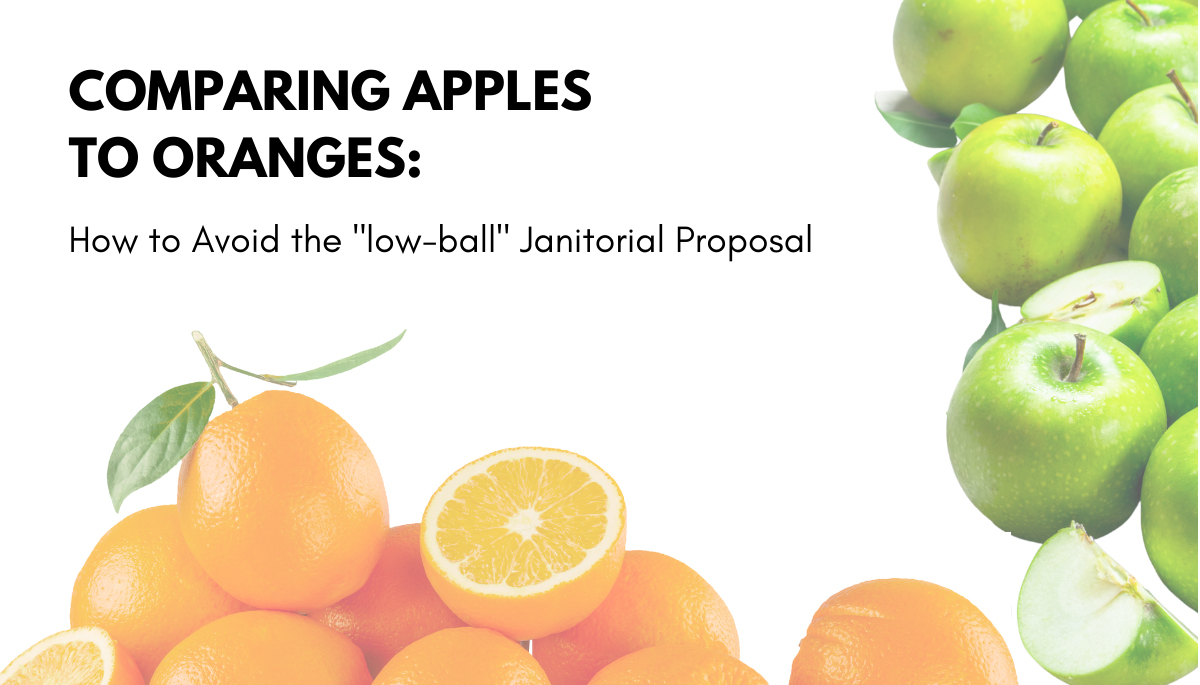Have you ever received cleaning service proposals that are significantly different in their pricing? It is not uncommon to have multiple janitorial services proposals with significant variances in pricing. Why does this occur?
In most cases, the variance is due to each cleaning company’s estimation of the number of staff hours needed to complete the cleaning tasks. However, there are other elements that go into the development of a cleaning proposal. The following six items should be a part of every cleaning proposal you receive:
Direct Staff Wages
Direct staff wages account for the largest portion of your cleaning services price—typically 60% of the total price. As such, companies providing proposals for your cleaning services should carefully consider two questions:
How long will it take us to clean this facility (number of staff hours)?
How much will we have to pay (market hourly wage) our cleaners?
It is helpful to provide as much information as possible to prospective vendors to help them determine the staff hours needed to complete all cleaning tasks.
HINT: Prospective vendors who ask good questions and take measurements tend to be the most accurate when determining staff hours. In addition, regional (vs. national) providers tend to have a better understanding of hourly wages in local markets.
Direct Staff Taxes & Benefits
In addition to payroll taxes, there are several other direct staff costs that prospective vendors should include in their proposed pricing. Things like vacations, employee benefits (e.g., insurance, 401K), background checks, drug screens, and uniforms should be considered and included in the pricing. This amount will vary by vendor (benefits provided) and location (state and local taxes).
HINT: Prospective vendors who provide some amount of benefits tend to have more satisfied employees and less turnover.
Supplies
Supplies represent the cost of items that are used on an ongoing basis. There are two types of supplies: (1) cleaning supplies such as cleaning chemicals, microfiber rags, scouring pads, etc., and (2) consumable items such as toilet tissue, paper hand towels, hand soap, etc. Most cleaning proposals include cleaning supplies in the base price.
HINT: Ask your prospective vendor to provide pricing per unit for consumable supplies. Most regional cleaning vendors receive excellent wholesale pricing for consumables that they will pass along to you and will manage the inventory of these items for you.
Equipment
Prospective vendors will need to invest in certain pieces of equipment to complete the work your facility requires. The cost and quantity of equipment needed will vary according to the scope and complexity of the work. Prospective vendors should consider the depreciation of their equipment and include this cost in their proposed pricing.
HINT: You should expect prospective vendors to have new/slightly used equipment while working at your facility. Vendors that use quality, maintained equipment tend to work more efficiently and have more satisfied employees.
Indirect Costs (Overhead)
There are a number of indirect costs that prospective vendors should include in their pricing. Examples of indirect costs: accounts payable/receivable costs, HR costs including the cost of recruiting, liability and workers’ comp insurance, management/supervision, etc. Unlike the other costs above, indirect costs should not vary much from customer to customer. In other words, vendors should have an indirect cost/overhead percentage that is applied to each customer.
HINT: The smartest cleaning companies keep a very close eye on overhead costs. Additionally, regional (vs. national) cleaning companies tend to have lower overhead costs.
Profit
It is important that prospective vendors derive a reasonable return for the work that they perform. Vendors with a healthy profit margin tend to provide better service and remain in business longer.
HINT: There are many “here today and gone tomorrow” cleaning companies who don’t consider all of these elements in their pricing, and subsequently are not able to sustain long-term profitability. As such, look for companies who have been in business for a number of years and provide strong references.
If the cleaning proposals you receive don’t have the above components included, make sure you ask about them. Otherwise, you could be signing a low-ball offer that you’ll regret later.

